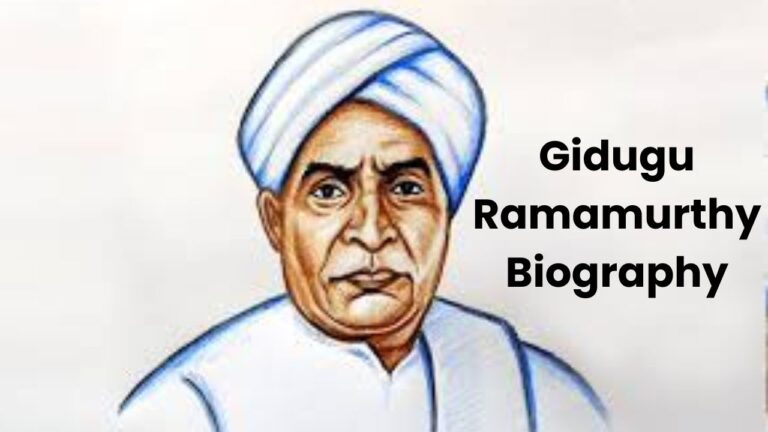Gidugu Ramamurthy biography
By yungsea
(Gidugu Ramamurthy biography, Age, wiki, Family, Name, Date of Birth, Family, Height, Career, Nick Name, Net Worth)
If You Are Searching For Gidugu Ramamurthy biography then you are at Right Place.. In This Post We Will Share With You Information About Gidugu Ramamurthy…
Contents [hide]
1 Gidugu Ramamurthy biography1.1 Contributions to the Telugu Language1.2 Work with Tribal Languages1.3 Recognition and Legacy1.4 Personal Life1.5 Conclusion
Gidugu Ramamurthy biography
Gidugu Venkata Ramamurthy was born on August 29, 1863, in Parvathalapeta, a small village near Sri Mukhalingam in the Srikakulam district, close to the Vamsadhara River on the Orissa border. His father, Gidugu Surya Narayana, was a farmer, and his mother, Adilakshmi, was a homemaker. After his father passed away, his sister Lakshmi took care of him. Ramamurthy studied at home and passed his matriculation exams while living with his sister. He then became a teacher at Gajapati Maharaja School in Parlakimidi, where he taught for 55 years.
Contributions to the Telugu Language
Gidugu Venkata Ramamurthy is known as a great linguist and social reformer who made important contributions to the Telugu language. He is often called the “Father of Modern Telugu” because he worked hard to simplify and standardize the language, making it easier for everyone to understand. Ramamurthy was unhappy with how complicated classical Telugu had become, filled with difficult Sanskrit words, so he started a movement to make it simpler. He believed that using everyday Telugu in schools would help more people learn to read and write and bring literature closer to ordinary people.
Work with Tribal Languages
Besides his work with Telugu, Ramamurthy also helped preserve the Savara language, spoken by the Savara tribe in the Parlakimidi area of Srikakulam district. He understood the importance of protecting indigenous languages and cultures and worked to document and keep the Savara language alive. His efforts helped the Savara community maintain their language, culture, and traditions.
Recognition and Legacy
Ramamurthy’s contributions were widely recognized. The British government awarded him the titles “Rao Saheb” and “Kaisar-i-Hind” for his service to the Savaras and his work in the Telugu language. European linguists, like Jules Bloch and Daniel Jones, also acknowledged his groundbreaking work in Munda linguistics. Today, August 29, his birthday, is celebrated as Telugu Language Day (Telugu Bhasha Dinotsavam) to honor his contributions.
Personal Life
Gidugu Venkata Ramamurthy married Seethamma in 1885, and they had one son, Gidugu Venkata Sitapati, who also became a linguist. Ramamurthy lived a long and healthy life, following traditional practices and a simple vegetarian diet. He passed away on January 22, 1940, at the age of 77 in Srikakulam, leaving behind a lasting impact on the Telugu language and the preservation of tribal languages.
Conclusion
Gidugu Venkata Ramamurthy’s life and work significantly influenced the Telugu language and helped preserve indigenous languages. His efforts to make Telugu simpler and more accessible to everyone have left a lasting legacy, and his work with the Savara community ensured that their cultural heritage was not lost. Every year, on Telugu Language Day, people remember and honor his contributions, keeping his memory alive for future generations.
So this is all the Information We Have About Gidugu Ramamurthy biography. You are free to use it as you like.

